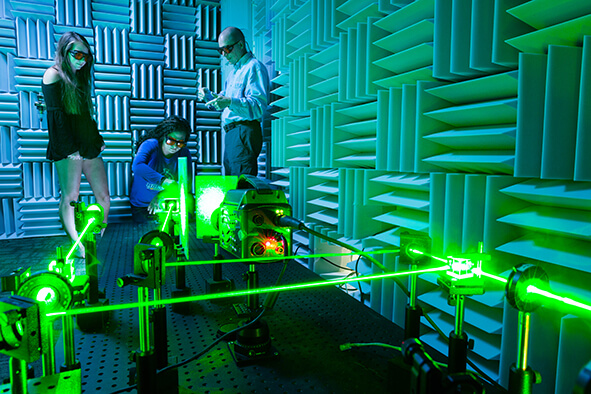Department of Physics
Physics Research
Beginning in your first year as a physics student, you are encouraged to collaborate with the faculty on original, professional research projects.

More Than Lecture
Physics is far more than textbooks and homework. Discover firsthand current physics research skills and practices alongside our award-winning faculty.
Physics Research at Rollins
The physics department is committed to engaging students in research throughout their academic careers. At Rollins, small class sizes allow you to get to know the faculty, and you will have the opportunity to perform original research with them, both during the school year and over the summer as part of the Student Faculty Collaborative Research Program.
Students are involved in all aspects of the research process: the experimental design, execution, and analysis. Before graduating, the majority of our students present their findings at national or international conferences, and many publish professional, peer-reviewed articles in top scientific journals.
Many graduates who have participated in physics research at Rollins have gone on to advanced study in laser physics, geophysics, biophysics, optics, and engineering. They go on to attend graduate schools such as Duke, Harvard, Cornell, Dartmouth, University of Rochester’s Institute of Optics, University of North Carolina at Chapel Hill, and many other prestigious institutions. Other graduates work in the private sector, applying their problem-solving skills to finance, software design, and management.
Acoustics
The study of acoustics encompasses all aspects of sound and vibration, but at Rollins research in acoustics is primarily dedicated to studying the physics of musical instruments.
Learn More
Astrophysics
Astrophysics research at Rollins falls into two subfields—origins of solar systems and extragalactic astronomy. Dr. Fuse and his students perform numerical simulations with gravitational N-body codes to model the late-stage formation of gas giant moons and exoplanets.
Learn More
Biophysics
The interdisciplinary field of biophysics applies the models of physics to complex biological systems. The field is wide, asking questions about everything from single molecules up to ecological systems. At Rollins, Dr. Murdaugh applies elasticity, electrostatic, and surface science models to elucidate the physicochemical interactions between organic and inorganic interfaces.
Learn More